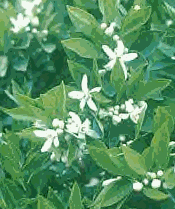
Essays
On Lemons
Surely, a war has turned on the having or the not having of them, in a Chinese province or in old Siam, the region that is realm to the citric exquisite. Earthly realm. For, who's to say that heaven's taste is not tang, any more than that it is a fenceless, frothy white, full of birdsong or 'insipid lutes'?

In an unrecorded myth, the lemon is daughter to grapefruit and orange, the bitter and the sweet, sister to the happy-go-lucky lime, that great craver of salt. And so, he is absorbed, while she combines, variously complement to disparate languages--pepper, olive, honey, cream--the companion to leaf and grain, well-spoken, well-kissed, but through all self-possessed, the undiminished embellishment of her own acerbic loveliness.
Fragrance. The lemon's heightens the senses while it clears the head, refreshing desire, not for itself directly, unlike the fleshy peach or pear. Not voluptuous, but rather, cerebral and slim, the lemon evokes midnight assignations in which words alone intoxicate, from behind ornamental screens, its scent lingering as lover parses through the keener meanings of speech, punctuated as by the riffle of silk.
The fruit whose juice preserves others was unknown to the Greeks and Romans, else Western poetry might have begun earlier some tradition of its praise. Goethe's Kennst du das Land wo die Zitronen blühen? is a reference to Italy, whose sun was relatively late to its husbandry, certainly well after its introduction into Spain and North Africa by 11th century Moors. Crusaders found it growing in Palestine. The first shipments to England from the Azores began only as Columbus cast off, bound for India. Lemon trees bloom year-round, each producing an average of 1500 fruits. For all their inner sharpness, they bruise so easily, harvesters must wear gloves.
Though sometimes 8 or 10 by permutation, the quintessential lemon's segments are 9, thus, a triple trinity little noticed because they are, for all the squeezing and slicing, so seldom left intact. Inedible, so we say, who praise the literal and figurative salt of the earth, the lemon may be the savor of air and, for all we know, the unsweetened elixir of heaven.
-- MH